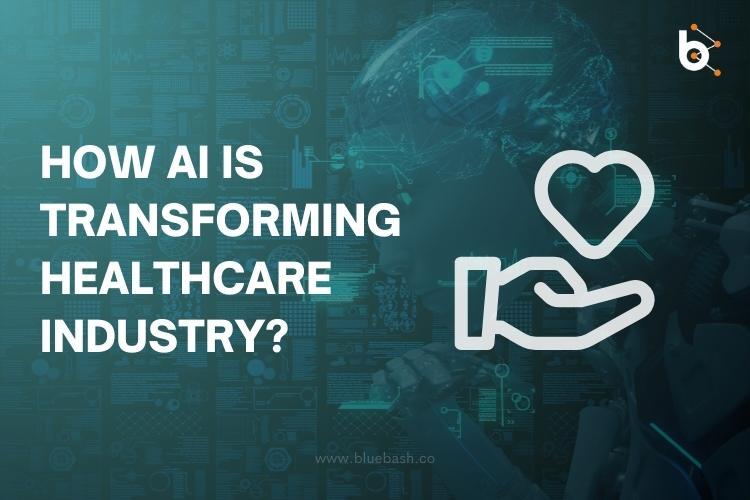Can AI in Healthcare Transform Healthcare? Yes, it is a resounding yes. Healthcare delivery has seen major changes in recent years, with the admirable effect pushed by Artificial Intelligence (AI). In this post, we look at how AI in Healthcare breakthroughs has resulted in huge gains ranging from diagnosis to perfecting therapy while streamlining administrative duties like never before thanks to AI integration with hospital systems.
We are astonished by the potential for additional development as a result of the enormous changes that have already occurred and the promises that have been made for a considerably enhanced and brighter healthcare delivery system. This analysis looks at the various applications, benefits, and potential future advances of AI in the healthcare industry. So you need to choose the best healthcare software development company in order to transform your healthtech industry properly.
What is the role of AI in the healthcare Industry?
AI in healthcare refers to the use of artificial intelligence technologies in the field of medicine to enhance patient outcomes. The analysis and interpretation of medical data using cutting-edge algorithms, machine learning, and data analytics to aid in diagnosis, forecast results, improve treatment options, and improve overall healthcare delivery.
AI applications in healthcare include clinical decision support systems, virtual assistants, medication research, patient monitoring, and personalized medicine.
Using AI, healthcare practitioners can enhance patient outcomes, speed up administrative tasks, and change the way healthcare is delivered.
What are the different applications in Healthcare?
The industry has a wide range of applications in healthcare that have the potential to transform the business. Among the most important applications of AI in healthcare are:
Image Analysis in Medicine
AI algorithms have made substantial improvements in the field of medical picture analysis. These computer-based devices can analyze a variety of medical pictures, including X-rays, CT scans, and MRIs. AI algorithms can help healthcare workers diagnose diseases and spot irregularities by performing this analysis and delivering quantifiable measurements.
Clinical Decision Making
Another area where AI has demonstrated its potential is clinical decision assistance. These AI-powered technologies can improve healthcare quality by providing doctors with real-time evidence-based support. This support is provided through the analysis of patient data and medical literature.
Discovering and Creating New Medicines
Artificial Intelligence (AI) plays a vital role in speeding up the process of finding new medicines. It sorts through massive amounts of data that would be hard for humans to go through. AI helps scientists quickly and accurately predict if potential new drugs could work. This makes developing new medicines faster and more targeted.
Seeing the Future with Data
AI also helps predict what might happen to patients based on data from similar cases around the world. This data comes from a huge global database. With this information, doctors can foresee how a disease might progress in a specific patient.
Remote monitoring and wearable devices
Wearable devices help doctors keep an eye on patients even from far away. These devices give real-time insights into a person’s health. This information goes into computer programs that quickly analyze it. Doctors can then see how patients are doing and offer help when needed. This technology is just one of many ways AI is changing healthcare for the better.
Benefits of AI in the healthtech Industry:
AI provides numerous benefits in the field of healthcare, it is revolutionizing the way where medical services are delivered. Some of the key benefits of AI in healthcare include:
Enhanced Diagnostic Accuracy
AI algorithms can analyze complicated medical data with high accuracy, such as medical pictures and patient information, allowing healthcare providers to make more precise and fast diagnoses.
Improved Treatment Planning
By analyzing patient data, medical literature, and treatment guidelines, AI can help create personalized treatment plans, resulting in more targeted and successful interventions.
Increased Productivity and Efficiency
Routine administrative activities, data input, and documentation can be automated by AI, freeing up healthcare professionals’ time to focus on patient care and complicated decision-making.
Some examples of AI tools used in the healthtech Industry
Here are some of the examples of AI tools used in healthtech industries:
Electronic Health Records:
EHR systems powered by AI let healthcare personnel manage and access patient records, such as medical history, prescriptions, allergies, and test results. These systems are capable of automating data entry, analyzing data for trends and insights, and facilitating decision-making.
Clinical Decision support systems:
CDSS uses AI algorithms to deliver evidence-based suggestions and alerts to healthcare practitioners during the diagnosis and treatment process. These systems can help identify potential drug interactions, provide treatment regimens, and increase patient safety.
Virtual Assistants and Chatbots:
AI-enabled virtual assistants or chatbots are gaining traction in personalized patient support because they enable one-on-one interactions with patients around the clock via digital channels such as chat rooms or email mode communication while providing essential health advice such as medication or disease information anytime, anywhere.
Conclusion:
The transformative power of AI in healthtech industry is unarguable. From enhancing diagnostic accuracy and treatment planning to streamlining administrative tasks, AI is reshaping healthcare delivery. The potential for further advancements is immense, promising a brighter future for healthcare. As AI-driven breakthroughs continue to evolve, we’re witnessing a paradigm shift that enables doctors to make more informed decisions, researchers to develop medicines faster, and patients to receive personalized, efficient care.
Embrace this technological revolution and join us on this journey to reshape healthcare as we know it. Explore the vast landscape of AI’s potential in healthcare – a future where innovation meets compassion and efficiency for the benefit of all.
